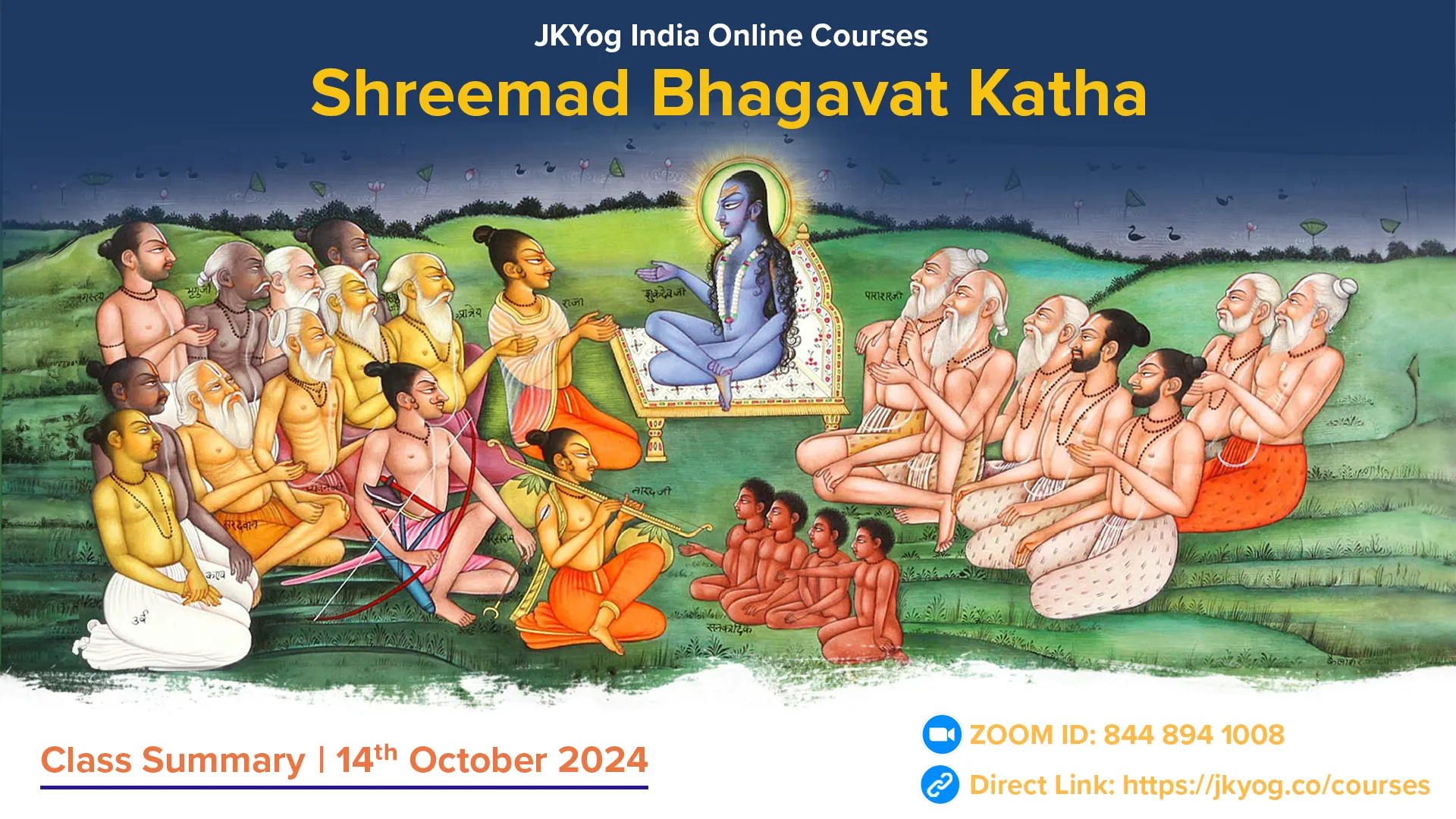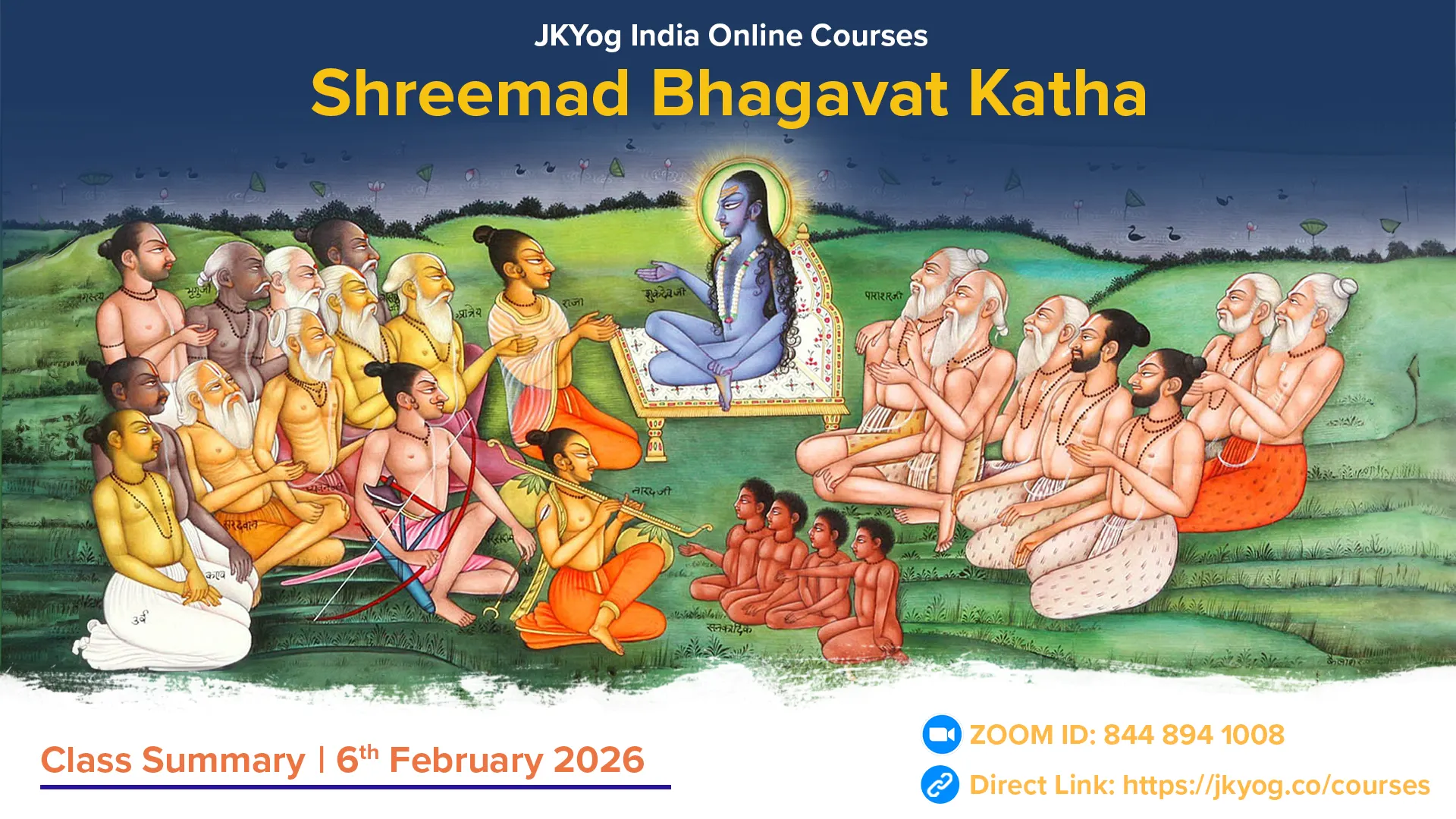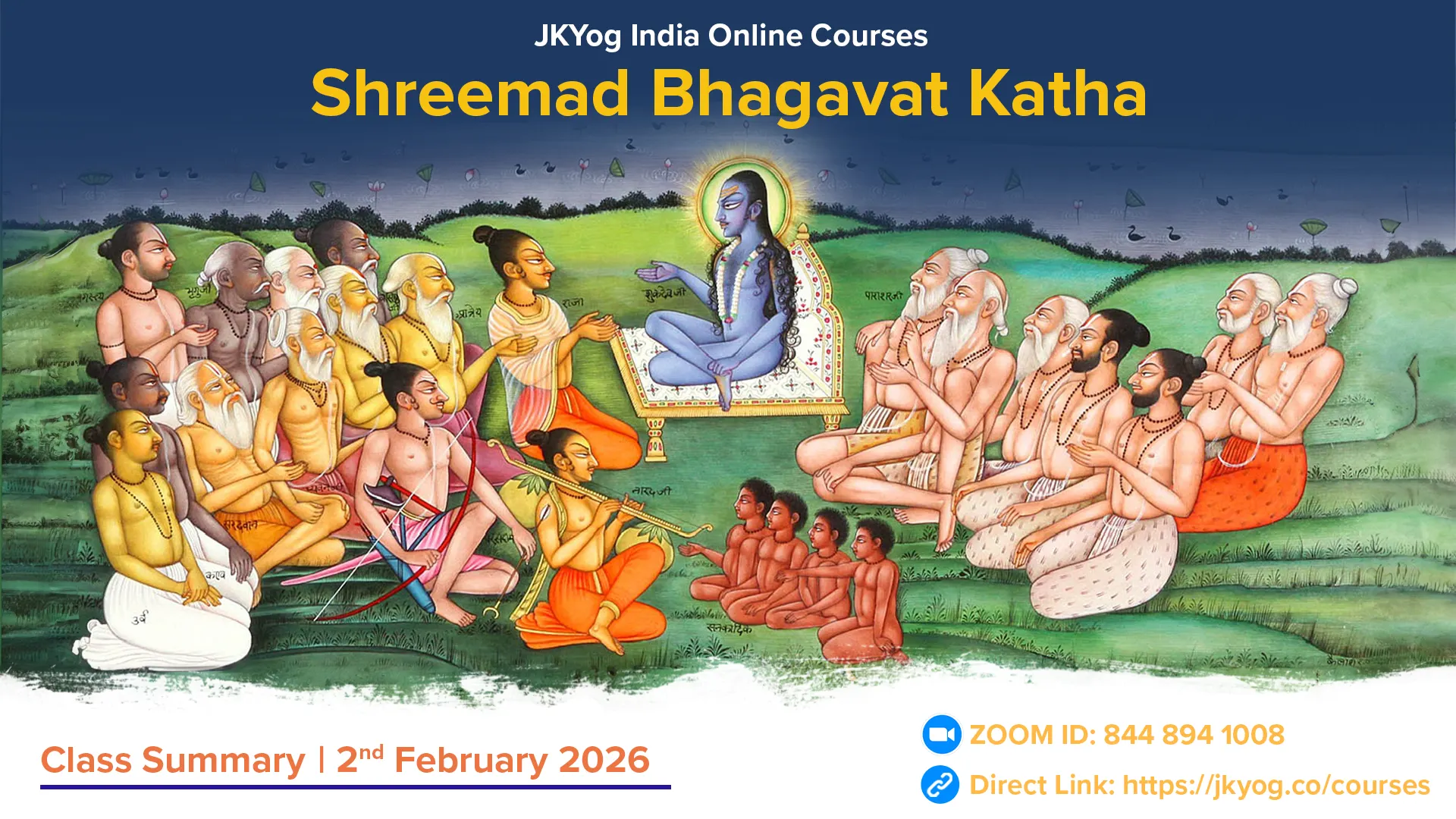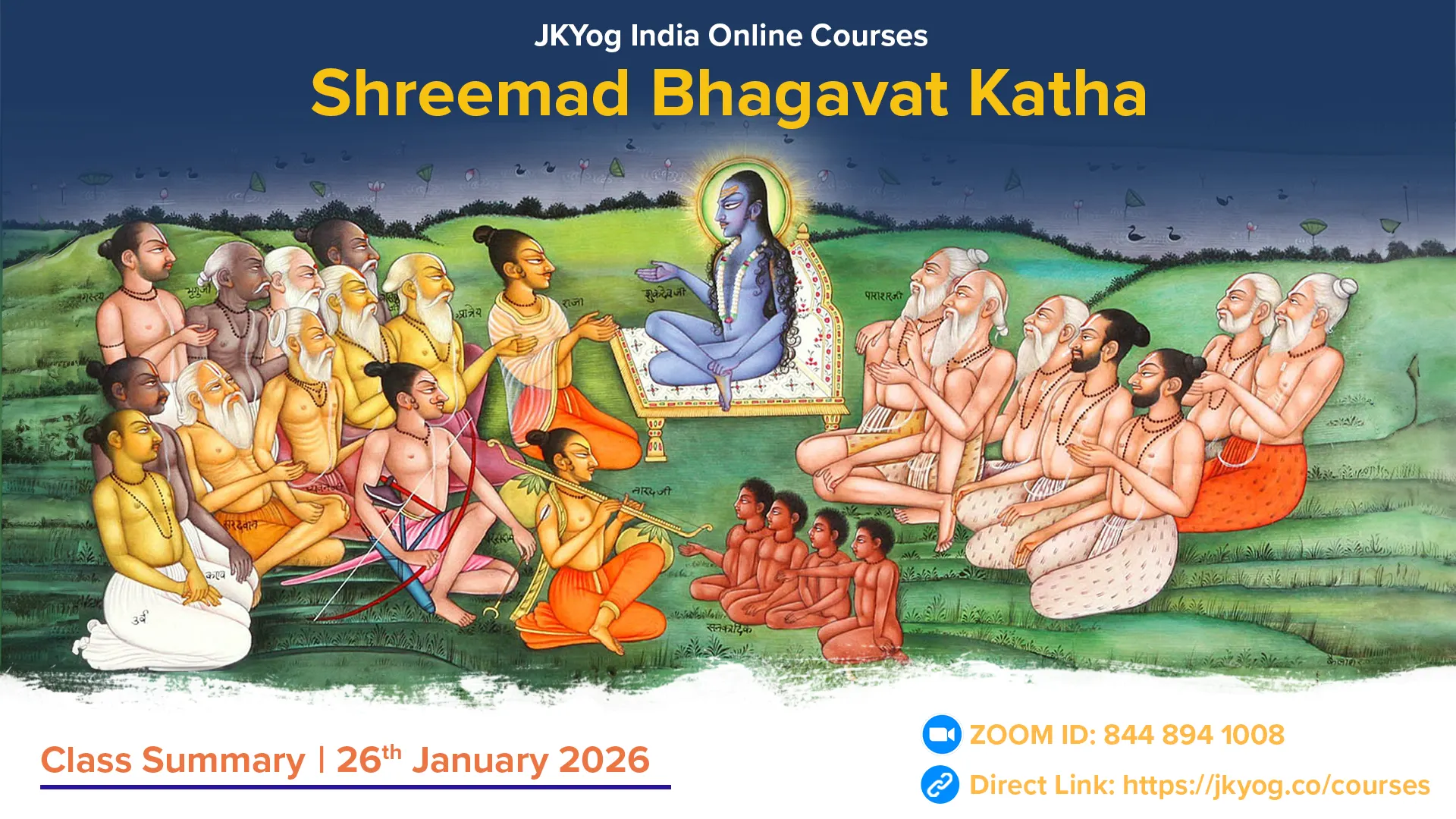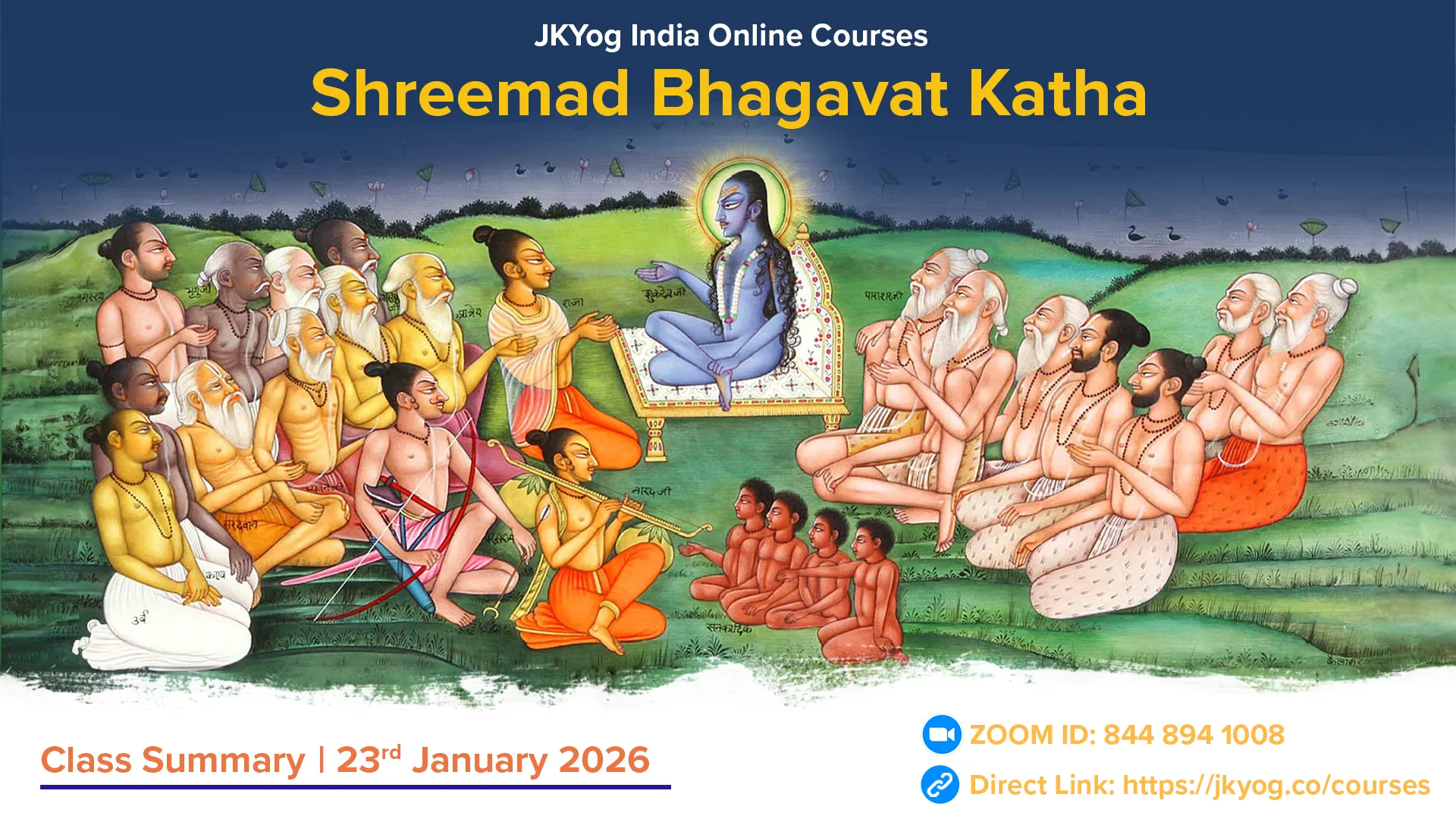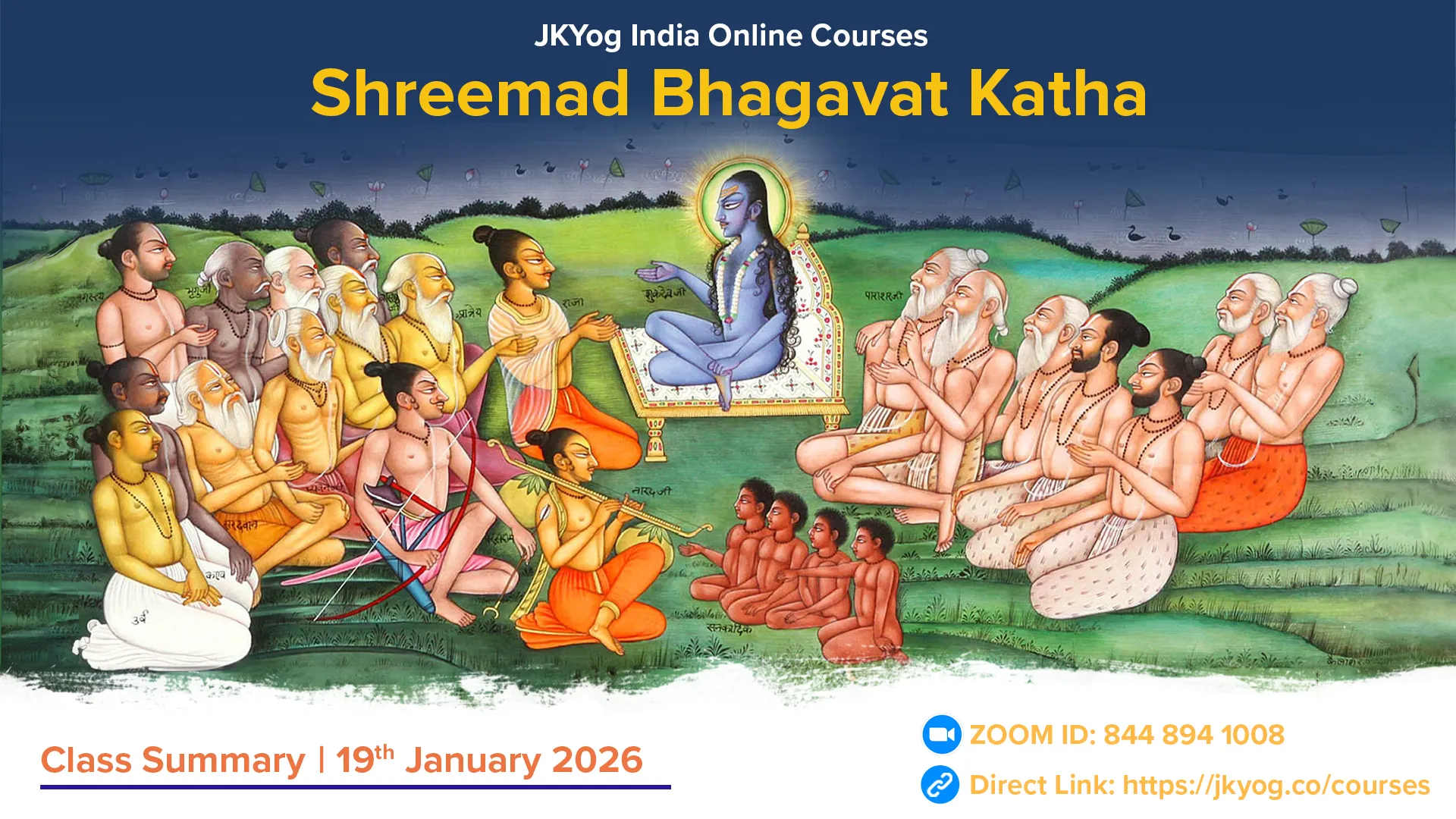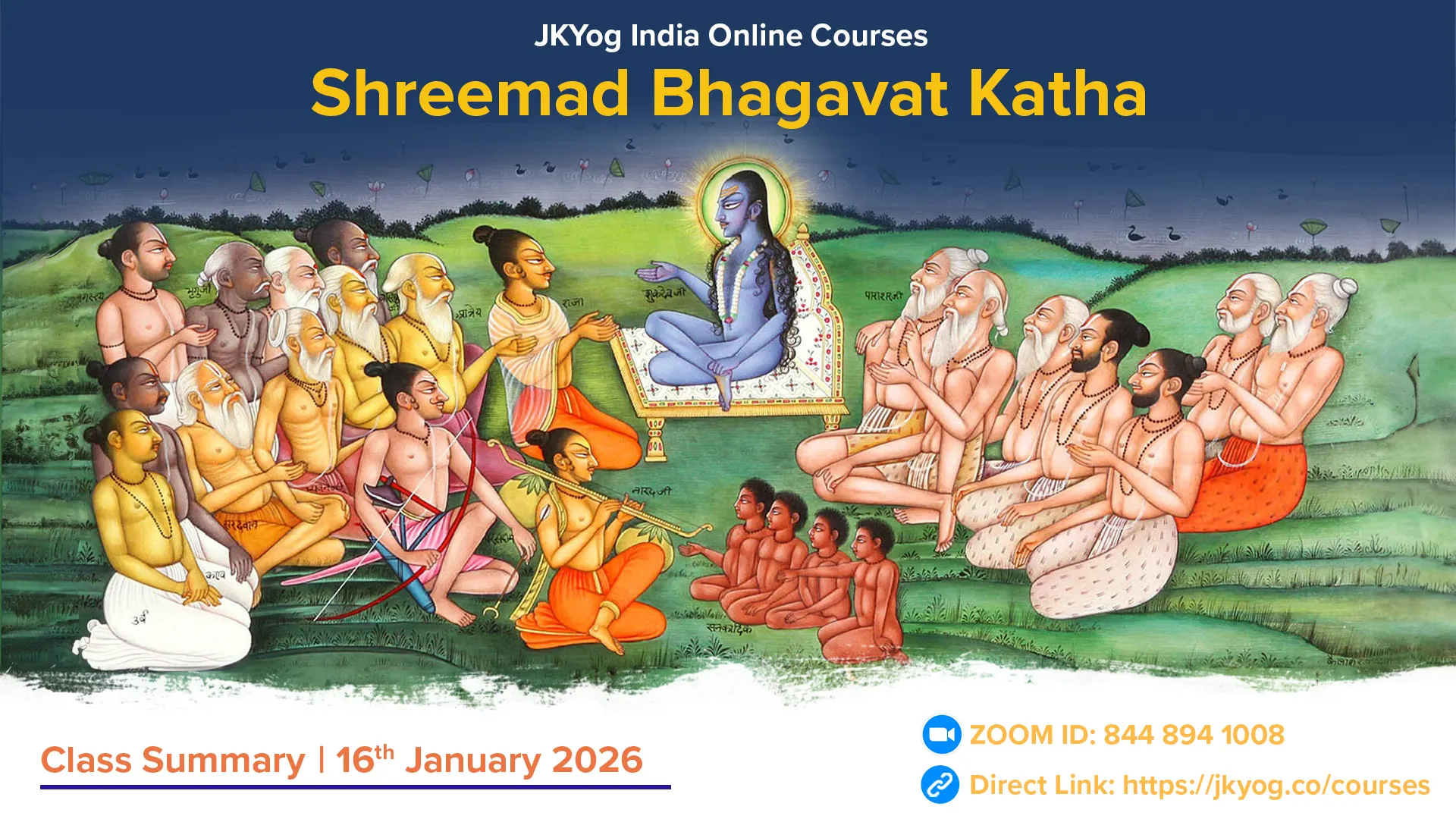Shreemad Bhagavat Mahapuran- Canto: 3, Chapters: 32 & 33
Sankhya Philosophy - The fate of those who follow the Archi Marg and the Dhoom Marg
Bhagwan Kapil tells Mata Devahuti that a person who lives in a household and follows the duties of a householder while enjoying wealth and desires for sensory objects becomes entangled in those very desires. As a result, he moves away from Bhagavat Dharma (devotion) and instead worships devatas (gods) and ancestors through yajnas (sacrificial rituals) with various rituals. His intellect becomes filled with that kind of faith, and devatas and ancestors become the objects of his worship. Therefore, he goes to Chandralok (the lunar realm) and drinks soma with them, but once his merit is exhausted, he returns to this world. When the time of cosmic dissolution (pralaya) arrives, and Bhagwan rests on Sheshnag, all the worlds attained by those who perform household duties with selfish desires also get destroyed. However, wise individuals who do not perform their duties for wealth or indulgence but instead do them for the pleasure of Bhagwan become detached, peaceful, pure-hearted, dedicated to the path of renunciation, and free from attachment and ego. Through the sattvaguna (quality of goodness) produced by their righteous actions, these individuals purify their hearts completely.
The Fate of Those Who Follow the Archi Marg
In the end, such pure-hearted souls attain Shree Hari, the all-pervading Supreme Being, through the path of the sun (Archimarga or Devayana). Shree Hari is the controller of this world and is responsible for the creation, preservation, and destruction of the universe. Those who worship Hiranyagarbha (Brahmaji) reside in Satyalok, the abode of Brahmaji, until the dissolution (pralaya) of Brahmaji. When Brahmaji, at the end of his lifespan, merges into the undifferentiated Supreme Being (Nirvishesha Paramatma) along with Prakriti (the material nature composed of the three gunas) and desires to destroy the entire universe—comprising earth, water, fire, air, space, mind, senses, their objects, and the ego—then those yogis who have conquered their mind and prana (life force) and have renounced their physical bodies also merge into Brahmaji and with him into the eternal, blissful Supreme Being, Parabrahma.
Before this dissolution, these yogis do not merge into Bhagwan, as traces of ego remain within them. Brahmaji, along with Marichi and other rishis, yogeshwaras (masters of yog), Sanakadi sages, and siddhas, attains the primordial form of Saguna Brahma (Brahma with attributes) through selfless actions. However, due to the existence of the sense of duality and the pride of doership, when the time for creation arrives, they re-emerge as before by the will of Bhagwan, prompted by the movement of the gunas (qualities) and inspired by Kaal Purush.
The Fate of a Karma-Attached Person Who Follows the Dhoom Marg
Those whose minds are attached to this world and who have faith in performing actions, continue to perform the prescribed kamyakarma (desire-driven actions) and nitya karma (obligatory duties) as outlined in the Vedas, following all the rituals meticulously. Due to the influence of rajoguna (the mode of passion), their intellect becomes weak, their hearts are entangled in desires, and their senses are beyond their control. They remain attached to their homes, and engaged in worshipping ancestors (pitris). These individuals are dedicated only to wealth (artha), duties (dharma), and desires (kama). As a result, they remain indifferent to the glorious stories and discourses of Shreemadhusudan Bhagwan, the one whose tremendous deeds are highly praiseworthy and who liberates souls from the fear of material existence (bhavabhaya).
Nunam daivena vihata ye chachyuta-kathasudham
Hitva shrnvanti asadgathaha purishamiva vidbhujaha
"Alas! Just as creatures like dogs and pigs desire to consume filth, those humans who forsake the nectar of Bhagwan's divine stories and instead listen to contemptible talks of worldly subjects are certainly cursed by fate. Their fortune is indeed poor, and they are truly unfortunate." (Bhagavat 3.32.19)
Those who perform all rituals meticulously, from garbhadhana (the conception rite) to antyeshti (the last rites) with desires in mind (sakamakarma), travel via the path of smoke (dhumamarga) to the realm of the ancestor gods, ruled by Pitreshwar Aryama. After enjoying the pleasures of pitraloka, when their accumulated merit diminishes, the devatas strip them of the splendours of that realm. As a result, they are forced to fall back into this world and are reborn into their own lineage.
Tasmattvam sarvabhavena bhajasva paramesthinam
Tadgun-ashrayaya bhaktya bhajani-ya-padambujam
Therefore, O Mother! Worship Bhagwan, whose lotus feet are always worthy of devotion, in every possible way—through mind, speech, and body—by taking refuge in bhakti (devotion), which is nurtured by His divine qualities. (Bhagavat 3.32.22)
Vasudeve bhagavati bhakti-yogaah prayojitaha
Janayatyashu vairagyam jnanam yad brahma-darshanam
Bhakti Yog performed with devotion toward Bhagwan Vasudev immediately grants detachment from the material world and leads to the attainment of knowledge in the form of direct realisation of Brahman. (Bhagavat 3.32.23)
In truth, all objects are forms of Bhagwan and, therefore, inherently equal. When, through the activities of the senses, a devotee's mind does not perceive any object as either pleasing or displeasing and instead sees Bhagwan in everything, he becomes free from attachment. Such a devotee, seeing Bhagwan everywhere, transcends both acceptance and rejection, remains neutral to both virtues and faults and realises his own soul as one with Brahman. Brahman is one, the embodiment of knowledge and devoid of attributes (nirguna). Yet, it appears in a variety of forms, seemingly possessing qualities like sound, etc., due to the misleading perceptions caused by the senses' external activities.
Just as the same Parabrahman manifests as the mahatattva (the cosmic principle) and as the three types of ego (ahankara): vaikarika (sattvic), rajas (passionate), and tamas (ignorant), which in turn give rise to the pancha-mahabhuta (five great elements) and the eleven senses, the self-illuminating Brahman, when associated with these elements, becomes known as the jiva (individual soul). Similarly, this universe, which manifests as a body for the jiva, is also truly Brahman since it originates from Brahman.
However, only one who, through unwavering practice of yoga, combined with faith, devotion, and detachment, has attained a focused mind and a detached intellect can perceive this universe as Brahman.
Bhagwan Kapil says, "Revered Mother! I have imparted to you this knowledge, which is the means for realising Brahman. Both Jnana Yog (the path of knowledge) related to understanding the formless Brahman and Bhakti Yog (the path of devotion) directed toward Me lead to the same result. Just as one object, which possesses qualities like form, taste, and smell, is perceived differently by various senses, in the same way, the one Bhagwan is experienced in multiple ways through the different paths prescribed by the scriptures."
He further explains that the knowledge He has shared should not be given to the wicked, ill-mannered, arrogant, or immoral individuals. Nor should it be given to those who are deeply attached to worldly pleasures, entangled in household life, or those who harbour enmity toward His devotees. Instead, this knowledge should be shared with those who are extremely devoted, humble, free from fault-finding, eager to serve the Guru, and who consider Bhagwan as their most beloved.
Bhagwan Kapil emphasises that anyone who listens to or recites this knowledge, even once, with focused meditation on Him, will attain His supreme abode. Upon hearing these words, Mata Devahuti, the beloved wife of Kardamji, felt the veil of delusion lifted from her mind. She then offered her respectful obeisance to Bhagwan Kapil, the one who had taught her the Sankhya philosophy, and began to praise Him.
Devahutiji says, "Brahmaji emerged from the lotus that sprouted from Your navel. While You were resting on the cosmic waters during the time of dissolution, he meditated on the qualities of the five elements, senses, and mind that emanate from You. You are inactive, true to Your divine will, and the Lord of all beings. By dividing Your powers into various forms, You create the universe. I have borne in my womb the very Bhagwan who, at the time of cosmic dissolution, absorbs everything into Himself and, at the end of the kalpa, rests alone on a banyan leaf.
You incarnate in a physical form for the welfare of Your devotees. The Kapil avatar, too, has appeared to impart knowledge to seekers of liberation. Merely hearing Your name can make even the gravest sinners worthy of reverence. Your divine presence brings immense benefit to humans. Those who chant Your name have fulfilled the essence of all dharmas.
O Kapiladevji, You are the direct manifestation of Parabrahma, and by the brilliance of Your presence, the flow of maya’s qualities is pacified. I bow to You and regard You as the form of Vishnu."
After being praised by His mother in this way, the compassionate Bhagwan Kapildevji spoke to her in a serious tone: "By adopting the easy path I have outlined for you, you will soon attain the supreme abode. Trust in my assurance. Those who are wise have followed this path, and through it, you can attain my form, which is free from birth and death. Those who are unaware of this path remain entangled in the cycle of birth and death."
Thus, imparting this profound wisdom, Shree Kapildevji took leave from His mother and departed. Devahuti began practising yoga in her ashram. Her curly locks transformed into brown matted hair, and due to her penance, her body grew weak. She renounced the comforts and pleasures Kardamji granted to her. Focusing her mind on the beautiful form of Bhagwan, as described by Kapildevji, her consciousness gradually purified, alleviating all her sorrows and leading her into supreme bliss.
Eventually, through the path shown by Kapildevji, Devahuti attained Bhagwan in a short period. Through her yogic practice, all bodily impurities were removed. She transformed into a river that is served by the perfected beings and grants all types of achievements.
Great yogi Bhagwan Kapilji, after taking leave from his mother, journeyed northeast from his father's ashram. There, the ocean itself worshipped him and provided him with a place to rest. To bestow peace upon the three worlds, he took to the path of yoga and entered into deep meditation.
The place where Devahuti attained Siddhi became renowned as ‘Siddhpad’. This location is now famous as Siddhpur, near Patan in Gujarat. This place is also referred to as Siddhpur Maatri Gaya Tirth, where people perform shraddha (ancestors offering) every year to liberate mothers during the month of Kartik. It is said that Bhagwan Parshuram also performed the shraddha for his mother at this very spot.
Summary: JKYog India Online Class- Shreemad Bhagavat Katha [Hindi]- 14.10.2024

